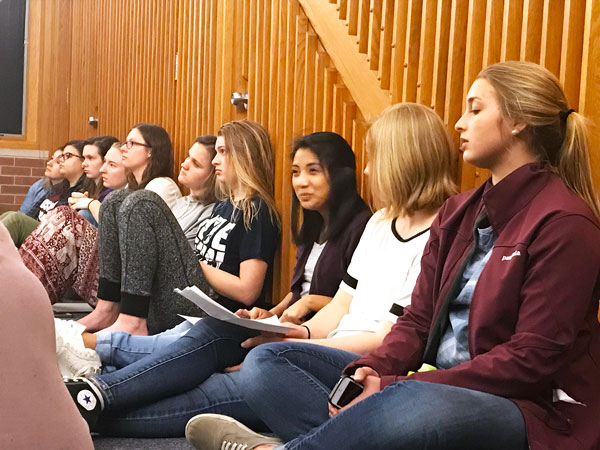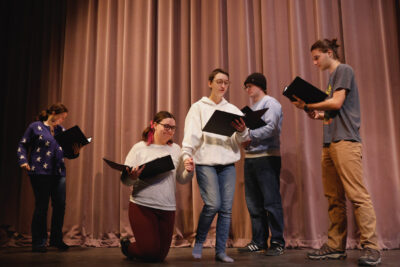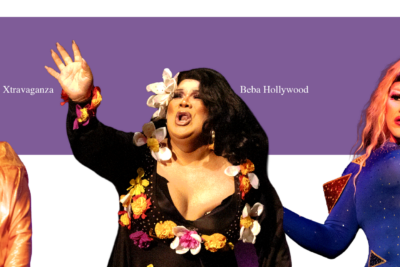In the dim light of the College Church-Chapel, the crowd’s volume drops from a low murmur to silence. A figure stands in the middle of the stage, surrounded by scarves and tapestries lovingly draped to cover the back wall. The figure breathes deeply and pauses, summoning the strength of the women who came before. In that moment, she becomes the story.
The first performance of the Goshen Monologues occurred in the spring of 2014. Earlier that school year, Lauren Treiber, a senior back then, sent out a call for stories from women and non-binary folks in the GC community. After that, Treiber crafted a script from the stories, calling upon the women and non-binary people of campus to perform it. Now in its fourth year, the Goshen Monologues has become an annual tradition of collecting and sharing stories.Anya Slabaugh, a senior and member of the five-person steering committee for the show, says that the Monologues are meant to uplift the voices of women and non-binary folks. Though the submissions are written from the perspective of those individuals, the themes of the stories reach beyond their gender and sexual identities.
“We’re all complex human beings,” Slabaugh said. She believes that, regardless of content, “if these stories are important to one woman or non-binary person, then they’re important to all of us.”
“I think the amount of energy people are putting into honoring other people’s stories is exciting,” said Beth Martin Birky, professor of English and women and gender studies and faculty advisor for the Monologues. “It’s not just the stories themselves but also the process of saying that everyone’s story matters.”
Slabaugh agreed.
“[Stories] can give people power…People talk about hearing their own piece that they’ve written and how that affects them. That’s super powerful for me and it’s why I’ve been doing this project for four years,” said Slabaugh.
The cast echo what Birky and Slabaugh say about the power of stories. This is senior Janeth Vela’s second year performing in the Monologues, and she said it has been a deeply impactful experience.
“It feels as though you are connected to the person who wrote the monologue, and it’s very emotional knowing you are giving a voice to someone who might not be able to share their story aloud,” Vela said.
Emily Vogt and Ellen Conrad, both seniors, value the relationships they build with fellow cast members. This is Vogt’s third time participating in the Monologues.
“I love the community aspect between the steering committee, the cast and those who submitted their stories,” said Vogt. “There’s just this strong sense of literally sharing it all together.”
Conrad, for whom this is her fourth Monologues, agreed.
“[The content] can get pretty heavy sometimes, but people are so supportive and uplifting. Not to mention pretty darn goofy at times, which is necessary,” said Conrad.
While Vela, Vogt, Conrad and Slabaugh, all seniors, bring several years of experience to the project, first-years like Rachael Klink bring fresh excitement and energy. For Klink, watching the development of the performance from script to stage has been a highlight.
“The most exciting thing is watching all the monologues come together,” said Klink. “It has been really moving to go from reading off a piece of paper to fully memorized and adding our own twist to things.”
Though the primary function of the Monologues is to create a space for non-binary people and women to share their stories, participants also hope the project facilitates broader understanding of some of the things these people face every day on campus.
“I think the main thing we want people to leave with is the recognition that these aren’t faraway stories that you hear from people you don’t know,” said Slabaugh. “These are people right here in our community. The likelihood that you know one or many people who have written a monologue is very high.”
Slabaugh hopes the impact of the show extends beyond Saturday night and sparks conversation about the experiences of non-binary people and women on campus. In order to provide space for the student body to process, there will be a series of formal conversations in the weeks following the show.
“If you want to support your female friends, if you want to show that you care about his sort of thing, then come to Monologues and then talk to your friends about it,” said Slabaugh. “If there’s something you don’t understand, then ask questions. That’s really important.”
The Goshen Monologues will be performed this Saturday, Mar. 11 at 7 p.m. in the Church-Chapel. Admission is free. ASL and Spanish interpretation will be available.


